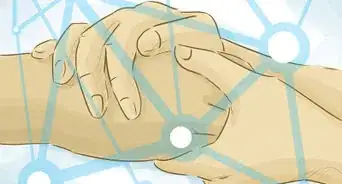This article was co-authored by Jennifer Guttman, PsyD. Dr. Jennifer Guttman, is a Cognitive Behavioral Therapist, Clinical Psychologist, and the Founder of the Sustainable Life Satisfaction®, a motivational and lifestyle platform. With over 30 years of experience and practice in New York City and Westport, Dr. Guttman specializes in treating people struggling with acute behavioral disorders stemming from anxiety, depression, stress, attention deficit, and phobias. She holds a Bachelor’s degree in Psychology from Drew University and a Doctor of Psychology from Long Island University. Dr. Guttman is the author of "A Path To Life Satisfaction Workbook (2018),” a monthly blog contributor to Psychology Today and Thrive Global, and a contributor to articles in major publications, media sites, and podcasts including The Washington Post, Reader's Digest, Redbook, Teen Vogue, Health, mindbodygreen.com, Harvesting Happiness, and Unshakable Self-Confidence.
This article has been viewed 34,483 times.
Feeling as though you are undeserving can hold you back and cause you to miss out on the best that life has to offer. Unfortunately, feelings of unworthiness are fairly common. You can fight against them and gradually see yourself as a more deserving person with enough persistence, though.
Steps
Part One: Identify the Problem
-
1Admit it. Be honest about the way you feel now. You may not be consciously aware of the way you cut yourself down, but if you're wondering how to feel more deserving, some part of you has been operating under the impression that you are undeserving.
- Look in the mirror and state, “I am a worthwhile and deserving person.” If you can say that line with confidence and no trace of doubt, your current mindset is probably okay. If you feel hesitation or disbelief, however, you might be holding onto the belief that you are undeserving.
-
2Ask yourself what would make you undeserving. Once you admit to feeling undeserving, ask yourself what qualities or characteristics make you so unworthy. These qualities may not really make you undeserving—in fact, they very likely don't—but they should be what makes you feel as though you are.
- Write your answers down and be as honest as possible. Some of your reasons might be obviously unhealthy—for instance, any dealing deal with your gender, race, or social class. Even so, if these are things that make you feel undeserving, you need to be honest about it.
Advertisement -
3Figure out the cause of your belief. After identifying the traits that make you feel unworthy, ask yourself why you think those traits make you undeserving. This will require a little more investigation. Usually, you'll realize that incidents from the past are directly connected to the way you feel in the present.
- Ask yourself how long your feelings of unworthiness have persisted. Once you realize how long you've felt the way you've felt, you can trace things back and start identifying the original source of those feelings.
- Figure out where your guilt originated. Most of these issues will likely be connected to some external force. It may have been something someone in your personal life made you feel or it could be something your community or society pressed on you.
-
4Let go of past regrets. Recognize that the past is in the past. Mistakes and missed opportunities are over and done with, so there is no reason for them to continually linger in your mind and prevent you from moving forward.[1]
- Self-compassion is necessary if you want to view yourself as someone who is just as deserving as anyone else, but guilt makes self-compassion impossible.
- Sometimes, letting go of past regrets will mean making amends for something you did wrong. Other times, there may be no way for you to make amends, and you may simply need to commit to the goal of being better in the present and future.
Part Two: Challenge the Problem
-
1Look around. Take a realistic look at the lives of people who have what you feel undeserving of. Ask yourself if they are truly innately more deserving of good things than you are. No one has any more value at the time of their birth than anyone else has.
- In fact, a quick look at the news will reveal plenty of people who are materially successful even though they are well-known liars, cheaters, or thieves. If people who are clearly dishonorable can obtain happiness, there is no reason to think that you don't deserve your own happiness.[2]
-
2View yourself from an outsider's perspective. Instead of being your own worst critic, become your own best friend. Imagine that you are speaking with a loved one whose personality is almost identical to yours. You may realize that you would treat that individual better than you're treating yourself.
- Think of someone supportive in your life. Ask yourself what that individual would say or do to support you through your undeserving feelings, then say or do the same things for yourself.
- Conversely, think of what you would say or do for someone you love if they were struggling with similar issues, then say or do the same for yourself.
-
3Stop making comparisons. Everyone has different circumstances, so the accomplishments of one person cannot be fairly compared to the accomplishments of another. Your life is yours to live, and there is no reason to think that things someone else has achieved are things you should have achieved, too.
- Instead of comparing yourself to others, compare yourself to yourself. Look at how far you've come, and focus on your accomplishment instead of your shortcomings as you reflect.
-
4Separate reality from fiction. Your expectations and the expectations others have of you may not be realistic. You'll never be perfect, so when you maintain a perfectionist attitude, you will always fall short of your goals. As a result, you will always feel as though you aren't good enough.
- You may never be able to forgive yourself for the things you haven't accomplished until you learn to adjust your standards. This may also mean that you need to let go of the standards others have set for you.
-
5Remove the sense of selfishness you feel.[3] You may find yourself thinking, “What makes me deserve this when someone else may never have it?” There will always be want in the world, though, and depriving yourself of something will not change the fact that someone else doesn't have it.
- Telling yourself that you deserve something does not imply that others don't deserve the same thing.
- Feeling deserving has nothing to do with your view of others. Instead, it simply means that you honor your own needs and desires.
- Additionally, when you feel deserving enough to take care of yourself, you'll naturally feel more energetic. That excess energy can then be used address the needs of others. In this sense, allowing yourself to feel deserving can actually make you a less selfish person.
Part Three: Move Forward
-
1Tell your inner critic to stop. As soon as a destructive or demotivating thought sneaks into your head, tell yourself to stop. Correct the negative thought with a positive action and press on.[4]
- Destructive thoughts are those that attack your worthiness as a human being. They include thoughts like, "I'm so lazy," "I have no talent," and "I'm ugly."
- Verbalize the command to stop when these types of thoughts enter your mind. You can mentally shout "STOP," or you could choose another word or phrase: "calm down," "don't go there," and so on.
- As soon as you stop your inner critic, redirect your energy to some constructive activity to prevent your thoughts from sinking back down.
-
2Learn how to motivate yourself. When you aren't able to motivate yourself, you won't be able to take the necessary first steps forward. This lack of forward motion can make you feel even more undeserving and less motivated. Break the cycle by learning what makes you tick and how to take advantage of it.
- Try reminding yourself of the benefits in completing certain tasks. If necessary, write these benefits down and post the note in a spot you will see daily.
- Consider refocusing your energy on goals you really want or activities you really enjoy doing. These types of tasks can be naturally easier to pursue, even if you initially feel undeserving of the privilege to pursue them.
-
3Appreciate your positive qualities. Take a few minutes each day to write a list of two to four positive qualities you can be proud of.[5] These characteristics do not need to be anything huge. In fact, a larger list of minor positives can have a greater impact than a short list of major positives.
- For example, one positive can be the you were able to listen to a friend's problem for a few minutes earlier in the day. Another could be that you had the willpower to make a healthier food choice at lunch than you were tempted to do.
-
4Force yourself to do the right thing. No matter how hard it is to be honest about something, treat someone well, or otherwise do the right thing, you need to force yourself to do it. Behaving in a way you know to be wrong will cause your conscience to haunt you, and the resulting feelings of guilt will prevent you from feeling deserving.
- Treating someone with respect is an especially important action to take. When you are able to recognize the innate worthiness in other people, you may gradually begin to see how that same sense of deserving can apply to your life, too.
-
5Step out of your comfort zone. Try something new. Move in a direction that is positive yet foreign to you. You may experience a few failures, but you will probably have a few successes, too. Succeeding at something you never though you could do can serve as a strong confidence booster.
- Try to keep your expectations down to a minimum when you pursue something new. Setting the bar too high can make you feel more undeserving if you fail to meet your goal, but lowering the bar too much can set your mind up to believe that you are incapable of accomplishing anything greater. Regardless of what you try, focus on the experience of doing it and seeing it through instead of dwelling on what may come of it.
-
6Spend time with supportive people. Gravitate toward people who support you and make you feel more deserving while distancing yourself from relationships that make you feel less worthy.
- People who treat you with respect send the message that you deserve that respect. The more often you can put yourself in that sort of environment, the more thoroughly that message can sink in.
- Similarly, unsupportive people will always send the message that you are incapable or undeserving. Spending too much time around these people will only cement your current feelings of unworthiness in place.
-
7Act before you believe. You will probably need to take your first steps forward before you fully believe in yourself and your own worthiness. Continuing to act in a deserving manner can gradually influence your thought patterns, though, making it easier to eventually believe that you are as deserving as your actions suggest.
- Start small by doing little things for yourself to encourage feelings of worthiness. Buy something nice for yourself or take the day off to visit someplace nearby you've been wanting to go to. Once you accustom yourself to the practice of self-kindness, you can gradually begin to do more significant acts of kindness for yourself
-
8Give yourself a daily reminder. Take a moment each day to specifically tell yourself, “I am deserving.” Get yourself used to this sentiment. Repetition can make you feel more comfortable, and as you become more comfortable with the practice of telling yourself that you deserve good things, you can become more comfortable with the practice of actually believing it.
- Consider expressing this sentiment verbally and in front of a mirror. The exercise may seem silly at first, but with enough practice, it will eventually begin to feel normal.
- When you succeed or do a good job at something, take a moment to recognize it and reward yourself.[6]
Expert Q&A
-
QuestionHow do you reward yourself for work?
 Jennifer Guttman, PsyDDr. Jennifer Guttman, is a Cognitive Behavioral Therapist, Clinical Psychologist, and the Founder of the Sustainable Life Satisfaction®, a motivational and lifestyle platform. With over 30 years of experience and practice in New York City and Westport, Dr. Guttman specializes in treating people struggling with acute behavioral disorders stemming from anxiety, depression, stress, attention deficit, and phobias. She holds a Bachelor’s degree in Psychology from Drew University and a Doctor of Psychology from Long Island University. Dr. Guttman is the author of "A Path To Life Satisfaction Workbook (2018),” a monthly blog contributor to Psychology Today and Thrive Global, and a contributor to articles in major publications, media sites, and podcasts including The Washington Post, Reader's Digest, Redbook, Teen Vogue, Health, mindbodygreen.com, Harvesting Happiness, and Unshakable Self-Confidence.
Jennifer Guttman, PsyDDr. Jennifer Guttman, is a Cognitive Behavioral Therapist, Clinical Psychologist, and the Founder of the Sustainable Life Satisfaction®, a motivational and lifestyle platform. With over 30 years of experience and practice in New York City and Westport, Dr. Guttman specializes in treating people struggling with acute behavioral disorders stemming from anxiety, depression, stress, attention deficit, and phobias. She holds a Bachelor’s degree in Psychology from Drew University and a Doctor of Psychology from Long Island University. Dr. Guttman is the author of "A Path To Life Satisfaction Workbook (2018),” a monthly blog contributor to Psychology Today and Thrive Global, and a contributor to articles in major publications, media sites, and podcasts including The Washington Post, Reader's Digest, Redbook, Teen Vogue, Health, mindbodygreen.com, Harvesting Happiness, and Unshakable Self-Confidence.
Licensed Clinical Psychologist You could reward yourself by getting a massage, taking yourself to the movies, buying yourself flowers, or going to a sporting event.
You could reward yourself by getting a massage, taking yourself to the movies, buying yourself flowers, or going to a sporting event. -
QuestionHow do you learn to feel good about yourself?
 Jennifer Guttman, PsyDDr. Jennifer Guttman, is a Cognitive Behavioral Therapist, Clinical Psychologist, and the Founder of the Sustainable Life Satisfaction®, a motivational and lifestyle platform. With over 30 years of experience and practice in New York City and Westport, Dr. Guttman specializes in treating people struggling with acute behavioral disorders stemming from anxiety, depression, stress, attention deficit, and phobias. She holds a Bachelor’s degree in Psychology from Drew University and a Doctor of Psychology from Long Island University. Dr. Guttman is the author of "A Path To Life Satisfaction Workbook (2018),” a monthly blog contributor to Psychology Today and Thrive Global, and a contributor to articles in major publications, media sites, and podcasts including The Washington Post, Reader's Digest, Redbook, Teen Vogue, Health, mindbodygreen.com, Harvesting Happiness, and Unshakable Self-Confidence.
Jennifer Guttman, PsyDDr. Jennifer Guttman, is a Cognitive Behavioral Therapist, Clinical Psychologist, and the Founder of the Sustainable Life Satisfaction®, a motivational and lifestyle platform. With over 30 years of experience and practice in New York City and Westport, Dr. Guttman specializes in treating people struggling with acute behavioral disorders stemming from anxiety, depression, stress, attention deficit, and phobias. She holds a Bachelor’s degree in Psychology from Drew University and a Doctor of Psychology from Long Island University. Dr. Guttman is the author of "A Path To Life Satisfaction Workbook (2018),” a monthly blog contributor to Psychology Today and Thrive Global, and a contributor to articles in major publications, media sites, and podcasts including The Washington Post, Reader's Digest, Redbook, Teen Vogue, Health, mindbodygreen.com, Harvesting Happiness, and Unshakable Self-Confidence.
Licensed Clinical Psychologist Practice writing daily self-affirmations that reflect your sense of self. You might write statements that reflect your integrity, loyalty, generosity, perspective, or honesty.
Practice writing daily self-affirmations that reflect your sense of self. You might write statements that reflect your integrity, loyalty, generosity, perspective, or honesty.
References
- ↑ http://www.psychologytoday.com/blog/me-we/201310/how-finally-feel-good-enough-deserve-better
- ↑ http://www.2knowmyself.com/depression/deserving_happiness
- ↑ http://www.bodylovewellness.com/2011/02/07/feeling-deserving/
- ↑ http://www.positivityblog.com/index.php/2013/09/11/improve-self-esteem/
- ↑ Jennifer Guttman, PsyD. Licensed Clinical Psychologist. Expert Interview. 26 July 2021.
- ↑ Jennifer Guttman, PsyD. Licensed Clinical Psychologist. Expert Interview. 26 July 2021.












































































